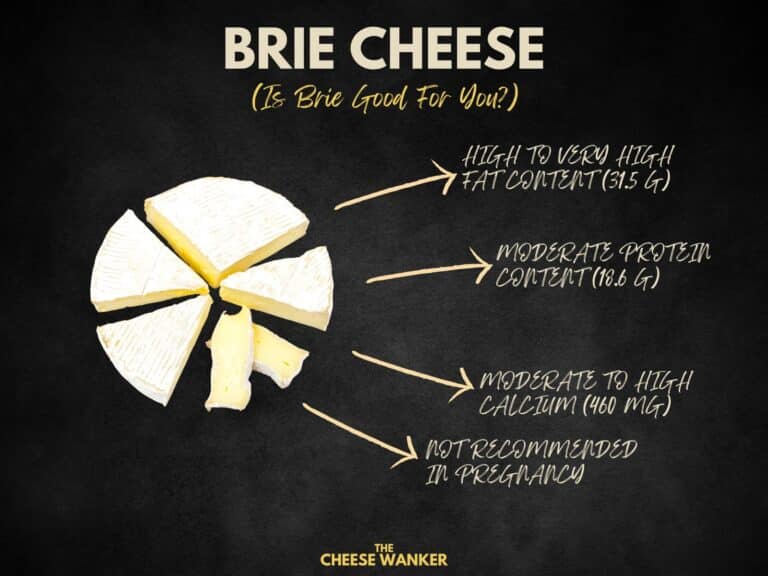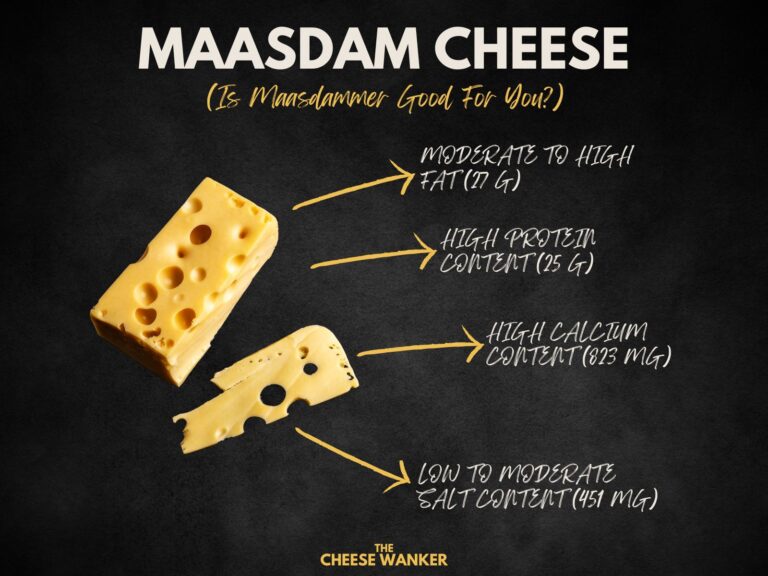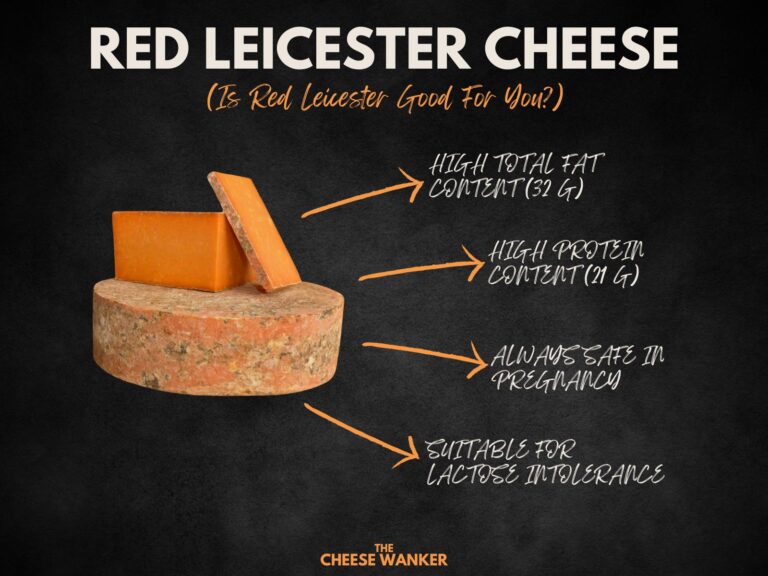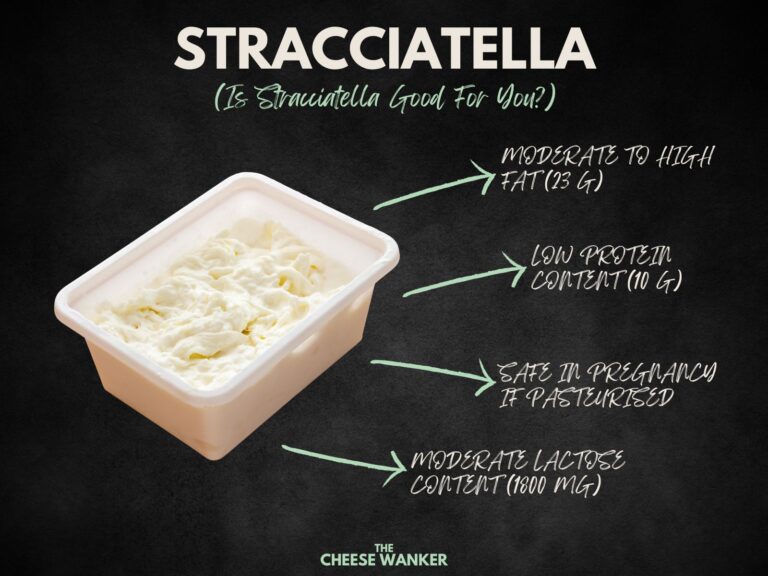Provolone Dolce, a renowned Italian cheese, captivates palates worldwide with its delightful taste and smooth texture. In this blog post, we delve into the nutrition facts of Provolone Dolce, unravelling its composition to understand the various aspects that make it a unique and delectable choice.
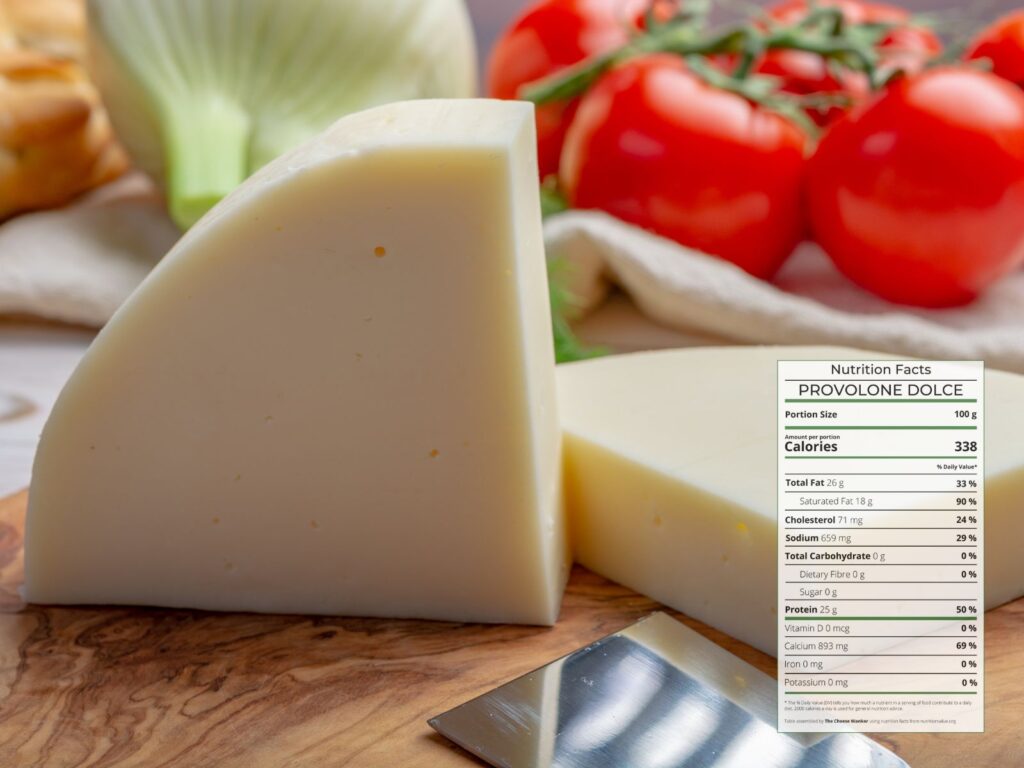
SEE ALSO: Nutrition facts for popular world cheeses in The Cheese Wanker’s index →
What is Provolone Dolce?
Provolone Dolce is a semi-soft, cow’s milk pasta filata cheese originating from northern Italy. It is crafted through a traditional cheesemaking process, involving curdling and stretching the curd, which gives it its characteristic elastic and stringy texture.
The cheese is then aged for a minimum of 10 days, allowing its flavours and texture to develop. Its characteristic pale-yellow hue and supple consistency make it an irresistible choice for cheese enthusiasts.
You can read more about the history of Italy’s most versatile cheese in this post here.
Nutrition fact sheet
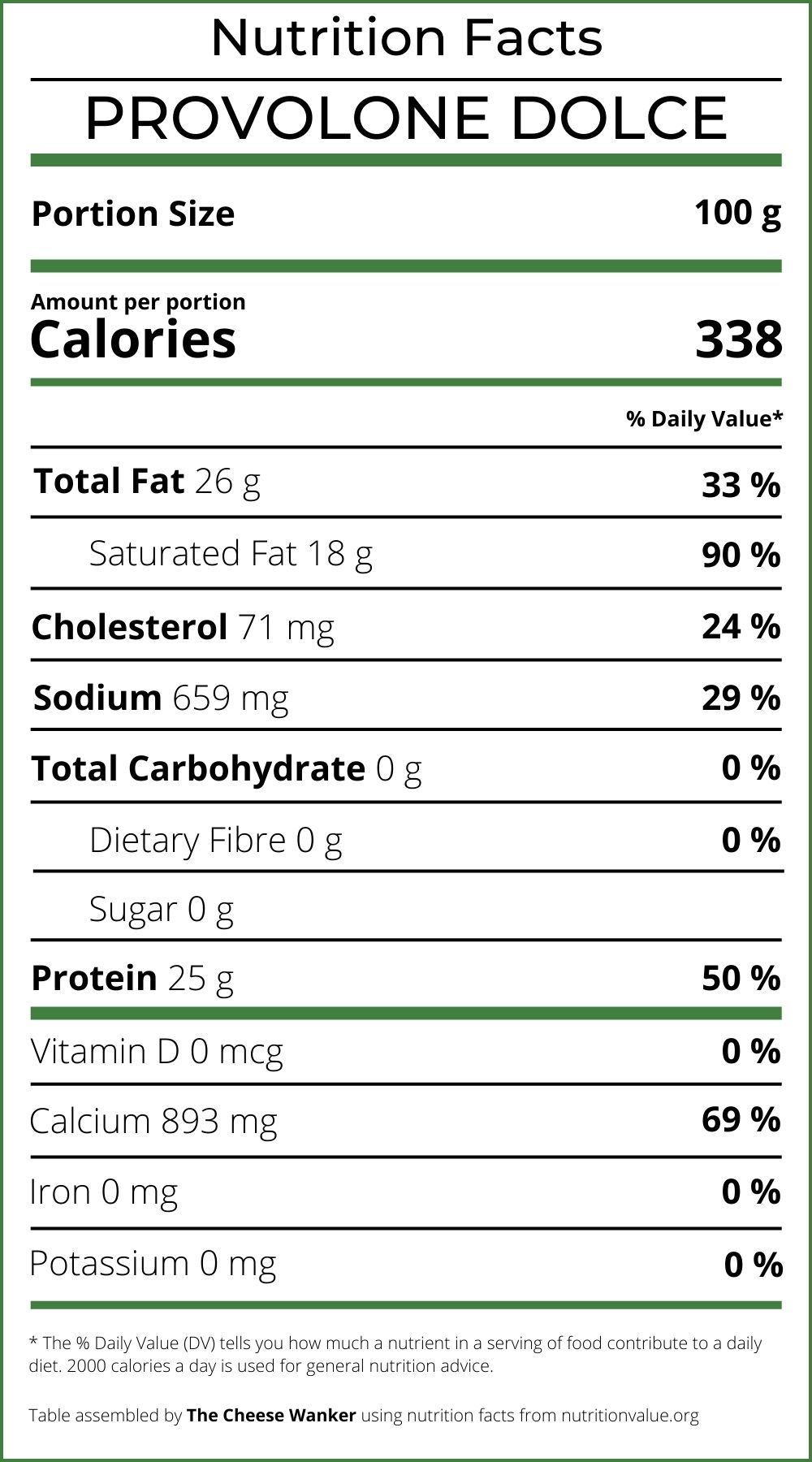
Nutritional review for Provolone Dolce
Eating healthy plays a pivotal role in maintaining overall well-being and preventing chronic diseases. A balanced and nutritious diet provides our bodies with essential vitamins, minerals, and macronutrients, fuelling optimal physical and cognitive function.
With this in mind, let’s have a look at some of the key nutrition facts for Provolone Dolce.
Lactose Intolerance
For people with lactose intolerance, the prospect of indulging in dairy products can be daunting. However, Provolone Dolce offers a ray of hope. Due to its unique manufacturing process, this cheese boasts a considerably reduced lactose content.
This makes it more digestible for lactose-intolerant individuals, enabling them to savour its exquisite flavours without experiencing discomfort. Thus, Provolone Dolce serves as an excellent alternative for those seeking lactose-friendly cheese options.
Having said, lactose sensitivity can vary from one person to the next. Therefore, if trying Provolone Dolce for the first time, you should test it out with a small sample.
Fat Content
When contemplating the nutritional aspects of Provolone Dolce, it is crucial to examine its fat content. This semi-soft cheese typically contains approximately 26 grams of fat per 100 gram serving.
While this may appear relatively high, it is important to note that the fat in Provolone Dolce predominantly comprises monounsaturated fats. These healthy fats contribute to a balanced diet and have been associated with various health benefits, such as reducing the risk of heart disease.
You can learn more about the different types of fat in cheese and which cheeses have the lowest fat content here.
Cholesterol Content
Provolone Dolce, like many other dairy products, contains cholesterol. However, its cholesterol content is modest compared to certain high-fat cheeses. A 100 g serving of Provolone Dolce usually provides around 70 mg of cholesterol.
It is worth noting that cholesterol in food does not have the same impact on blood cholesterol levels as dietary saturated and trans fats. Incorporating Provolone Dolce into a well-rounded diet can be part of a heart-healthy eating pattern.
Protein Content
Protein, a crucial macronutrient, plays a vital role in maintaining and repairing body tissues. Provolone Dolce provides a commendable amount of protein, making it a valuable addition to a balanced diet.
On average, 100 g of this cheese offers approximately 25 g of protein. Including Provolone Dolce in your meals can help fulfil your body’s protein requirements and contribute to muscle maintenance and overall well-being.
Want to find out which cheeses have the highest protein content? Click here for our blog post covering cheeses with the highest protein content.
Safety in Pregnancy
Pregnancy calls for heightened caution when it comes to dietary choices. The good news is that Provolone Dolce is considered safe for consumption during pregnancy. Made from pasteurised cow’s milk, this cheese undergoes thorough processing, minimising the risk of harmful bacteria.
However, it is still crucial to ensure that the cheese is stored and handled properly to prevent contamination. As always, it is advisable to consult with your healthcare provider for personalised advice regarding your pregnancy diet.
You can read more about which cheeses you can eat when you’re pregnant by clicking here.
Salt Content
Excessive salt intake can be detrimental to health, making it essential to assess the salt content in foods. Provolone Dolce typically contains around 650 milligrams of sodium per 100 g. As a matter of fact, this is much lower than the sodium content in the more mature, spicy version, Provolone Piccante.
While this cheese is not excessively high in sodium, individuals with specific dietary requirements or conditions such as hypertension may need to moderate their intake. As part of a balanced diet, monitoring overall sodium consumption is crucial for maintaining optimal health.
You can read more about why salt is important in cheesemaking in our comprehensive post here.
Calcium Content
Calcium, an essential mineral, plays a pivotal role in bone health and various physiological functions. Provolone Dolce serves as a valuable source of calcium, providing approximately 900 milligrams per 100 gram serving.
Incorporating this cheese into your diet can contribute to meeting your daily calcium requirements and support the maintenance of healthy bones and teeth. It is particularly beneficial for individuals with lactose intolerance, as they may need alternative calcium sources due to restricted dairy consumption.
Conclusion
Provolone Dolce offers not only a delightful taste but also a range of nutritional benefits. With reduced lactose content, it serves as an excellent option for individuals with lactose intolerance.
While it contains moderate amounts of fat and cholesterol, Provolone Dolce predominantly comprises heart-healthy monounsaturated fats. Its protein content makes it a valuable addition to a balanced diet, aiding in tissue repair and maintenance.
During pregnancy, this cheese can be safely enjoyed when handled properly. Although its sodium content is not excessive, individuals with specific dietary requirements may need to moderate their intake. Finally, Provolone Dolce serves as a noteworthy source of calcium, supporting bone health.
What’s your favourite way to enjoy this Italian delight? Let us know in the comments below.
References
Overall nutritional content
The nutritional content of cheese in our table comes from the USDA Food Data Central Repository, the Australian Food Composition Database and cheese manufacturers. We realise that there can be variations between different brands and producers. Hence, the numbers we have used are averages.
Fat content
Our fat RDI data comes from Cleveland Clinic’s Healthy Fat Intake resource.
Type of fat in cheese as per Harvard T.H. Chan’s The Nutrition Source.
Protein content
Our protein RDI data comes from Harvard Medical School’s Harvard Health Publishing.
Cholesterol content
Is There a Correlation between Dietary and Blood Cholesterol? Evidence from Epidemiological Data and Clinical Interventions? – Maria Luz Fernandez and Ana Gabriela Murillo
Saturated fat, carbohydrate, and cardiovascular disease – Patty W Siri-Tarino, Qi Sun, Frank B Hu and Ronald M Krauss
Effect of cheese consumption on blood lipids: a systematic review and meta-analysis of randomized controlled trials – Janette de Goede, Johanna M Geleijnse, Eric L Ding, Sabita S Soedamah-Muthu
Safety in pregnancy
All the advice relating to what cheeses you can eat during pregnancy in this article is based on the recommendations by health authorities in Australia, the UK and the USA. If you are unsure about what you can or cannot eat, please consult your doctor.
Australia – FSANZ, United Kingdom – NHS and United Sates of America – FDA
Lactose content
Lactose residual content in PDO cheeses
Detection of lactose in products with low lactose content
The analysis of lactose in milk and cheese products by HPLC
Food Standards ANZ Food Composition Database
Lactose & Galactose content of cheese
